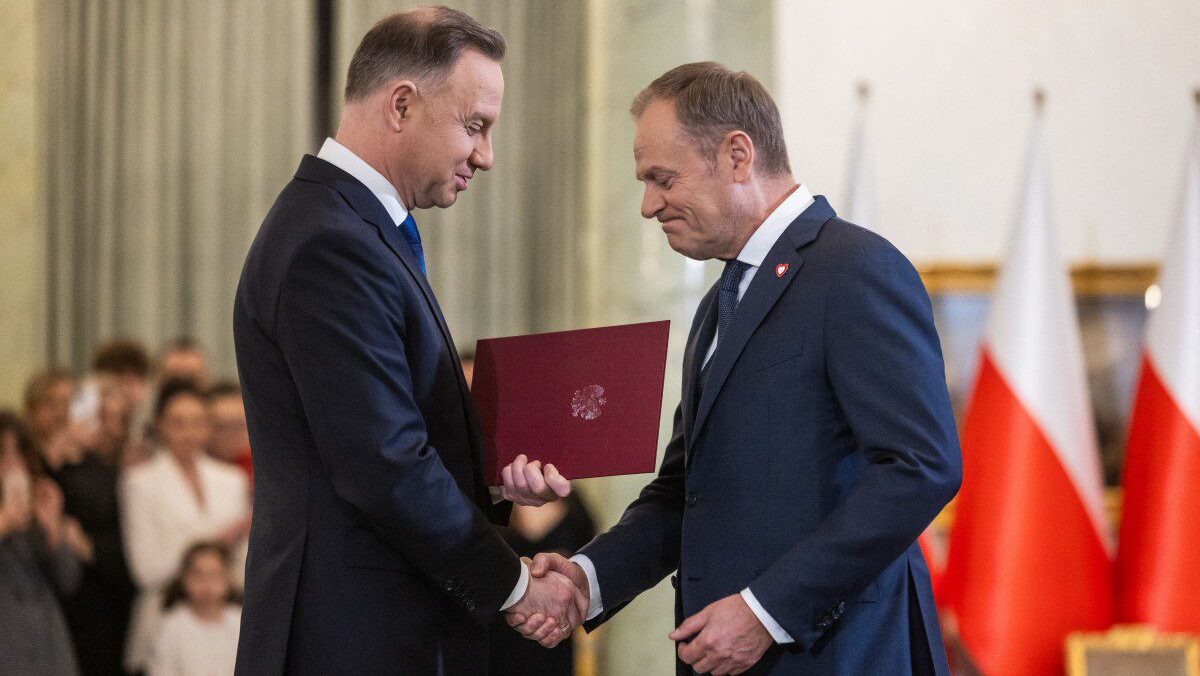
Poland’s President Andrzej Duda (L) hands the assignment document to Donald Tusk to designate him as Poland’s Prime Minister, during a formal swearing-in ceremony at the Presidential Palace in Warsaw, Poland, on December 13, 2023.
Photo: by Wojtek Radwanski / AFP
New Prime Minister Donald Tusk’s government was sworn in by Poland’s President Andrzej Duda on Wednesday, December 13th, marking the end of eight years of conservative-nationalist rule, and bringing back centre-right-liberal Tusk to the helm of the government, a position he previously held from 2007 to 2014.
Andrzej Duda, an ally of the previous administration, said that despite the obvious differences he will cooperate on matters key to Poland’s security and the people’s well-being, but stressed that he believes that most things are in perfect shape. He said he was “open to working together” with the new cabinet on issues such as climate, national security, and research and development. Duda also declared he would not block legislation that “benefits Poland.”
Prezydent @AndrzejDuda: Słowa o trwaniu narodu polskiego i Rzeczypospolitej, które są wyrażone w ślubowaniu, powinny być dla nas najważniejszą dewizą. pic.twitter.com/EDxtrbDAy6
— Kancelaria Prezydenta (@prezydentpl) December 13, 2023
Tusk said he greeted Duda’s declaration “with great joy,” but also vowed to respect Poland’s constitution and other laws. Tusk and other politicians from the incoming government have criticised the previous conservative cabinet, and Duda himself, for undermining the rule of law. Tusk has also vowed to hold to account anyone who “broke the law” during those eight years.
While the outgoing government—helmed by the Law and Justice (PiS) party—had many clashes with European institutions over its conservative stance involving migration, abortion, gender ideology, and LGBT issues, Donald Tusk will likely maintain a stronger relationship with Germany and the EU and loosen ties with the Central European alliance of the Visegrád nations.
Tusk’s government won a vote of confidence in parliament on Tuesday evening, and in his speech, he vowed that, under his government, Poland would regain its “rightful position” in the European Union. He promised to “restore the rule of law” and unblock €59.8 billion in grants and loans from the EU that have been frozen because of so-called rule-of-law issues.
On Ukraine, he promised to be just as resilient as the previous government in supporting the neighbouring country under attack from Russia, but went one step further:
We will call loud and clear for full mobilisation on the part of the free world, the West in support of Ukraine in this war. There is no alternative.
He added he “can no longer listen to some European politicians and those from other Western countries who say they are tired of the situation in Ukraine.” As we reported, there is indeed an ever-growing fatigue with the war and the funding of Ukraine in both Europe and the United States. Tusk will head to Brussels on Thursday where the upcoming EU summit’s main item on the agenda will be granting further aid to Ukraine, and approving the start of EU accession talks, both rejected by Hungary.
While most EU member states agree that supplying Ukraine with weapons is inevitable for repelling the Russian attack, a call for mobilisation is something new, as no Western ally of Ukraine wants to send its soldiers to war. However, what Tusk actually meant by “mobilisation” remains unclear.
“Poland’s task, the new government’s task, but also the task of all of us, is to loudly and firmly demand the full determination from the entire Western community to help Ukraine in this war. I will do this from day one,” he emphasised.
Though Poland has been Ukraine’s staunchest ally in its fight against Russia, delivering weapons and accepting millions of Ukrainian refugees, the relationship has been strained by the Polish ban on Ukrainian grain imports and the blocking of the two countries’ borders by Polish truck drivers who complain they have had to endure unfair competition from Ukraine. The new government will likely maintain the policy of stopping Ukrainian grain from flooding the Polish markets, with Tusk previously complaining that Ukrainian grain “is ruining Polish farmers and making us all wonder what flour Polish bread is made of.”
In the new coalition, the Ministry of Agriculture is held by the Polish People’s Party, one of the more conservative forces within the government that is formed of more than a dozen parties from left to right. To appease the right side of the political spectrum, including the socially conservative Christian democratic anti-abortion Polish People’s Party, EU-aligned Tusk will have to show conservative voters that his government is willing to defend Polish sovereignty.
